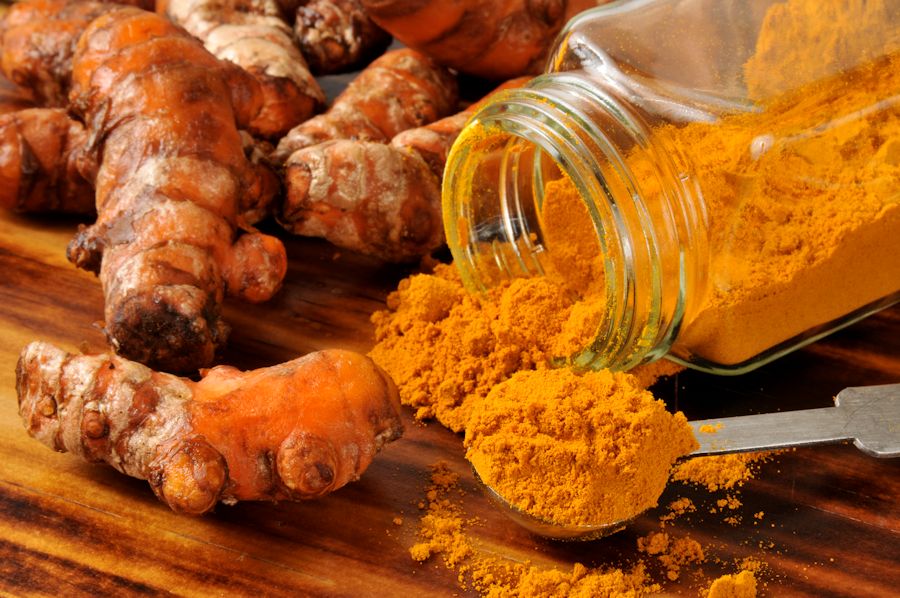Last Updated on September 6, 2020 by Nick

Fresh turmeric root, and ground spice – shallow depth of field
Contents
- 1 At a Glance
- 2 Can Turmeric Be Used for Healing?
- 3 1. Turmeric May Improve Brain Function And Prevent Alzheimer’s Disease
- 4 2. Turmeric Boosts Mood And May Help With Depression
- 5 3. Turmeric Has Incredible Anti-Inflammatory Properties
- 6 4. Turmeric Can Relieve Pain
- 7 5. Turmeric May Improve Liver Function
- 8 6. Turmeric May Reduce the Risk of Getting Cancer
- 9 7. Turmeric May Aid Digestion
- 10 What To Look For In A Turmeric Supplement?
At a Glance
Turmeric root is used in traditional Asian and Indian cuisine. It tastes lovely in many types of food such as:
- Smoothies
- Soup
- Curry
- Stew
- Rice
- Hummus
- Vegetables
Turmeric also adds a lovely yellow color to foods. It will stain, however, so take care when using turmeric in the kitchen.
Not only does turmeric add a terrific taste to rice and Indian dishes, but turmeric is also being studied for use as giving healing benefits. While tests on turmeric’s ingredients continue, scientists continue to study the health benefits of turmeric.
Can Turmeric Be Used for Healing?
Turmeric contains Curcuminoids that in themselves contain a plethora of natural antioxidants. Turmeric is used in India is a part of their traditional medicine. To do this, naturopaths make a paste of ground turmeric and water.
This paste is placed on the skin and a warm cloth compress over the sore muscles.
Many people who use natural methods to help them feel better swear by turmeric’s healing powers.
While studies continue to see why and how curcumin and curcuminoids may be of assistance medically (video below), individuals continue to try using turmeric and Curcuminoids for other reasons than merely food color and flavoring.
1. Turmeric May Improve Brain Function And Prevent Alzheimer’s Disease
Turmeric may prevent brain function disorders such as Alzheimer’s disease. Scientists do know curcumin, the active ingredient in turmeric crosses the blood-brain barrier.
This spice also prevents plaques from forming in the brain that cause protein tangles, such as occur in Alzheimer’s disease. Studies continue to determine whether curcumin can slow down or reverse the damaging progress of Alzheimer’s disease or not. But these initial studies are hopeful.
According to one German study, the curcumins in turmeric may boost the brain’s ability to heal from the damage it has incurred. This study suggests that an ingredient found in turmeric, called aromatic-turmerone encourages nerve cell growth.
This test was performed on rats, and may eventually explain whether people with strokes or Alzheimer’s, as well as other types of mental decline, can regain brain function using aromatic-turmerone chemicals.
The rats in the study were given aromatic-turmerone injections, after which their brains were scanned. The researchers discovered that the rats’ brain cells were more active after they received an infusion of aromatic-turmerone.
It was then surmised that aromatic-turmerone might encourage brain cell stimulation. Turmeric-based treatments helped the brains of the rats studied.
Research has a way to go, however, before it can definitely determine that turmeric can help people with dementia symptoms.
In another part of the study, researchers immersed rodent brain stem cells (NCSs) in an aromatic-turmerone extract. NCS cells have the potential to change into any brain cell, so they are being looked at to see if aromatic-turmerone can help such cells repair if they become damaged.
The researchers discovered that the higher concentration of turmeric based aromatic-turmerone was given, the greater the amount of growth of the neural brain cells in the animal tested.
While smaller animals’ brain cells seem to respond to treatment with the turmeric based chemical, more research remains needed to determine whether aromatic-turmerone will work on larger animals or humans.
Researchers are now determining how to proceed with aromatic-turmerone trial tests on human brains.
Inflammation and oxidation damage may also be a part of the onset of Alzheimer’s disease. Curcumin has beneficial effects on both oxidative damage and reduces inflammation and may reduce or improve the signs of Alzheimer’s disease.
More studies are needed to discover more information about curcumin’s role in preventing brain diseases and preventing brain damage.
2. Turmeric Boosts Mood And May Help With Depression
Curcumin works as a biologically active phytochemical.
That is present in turmeric that seems to help people with anxiety and depression associated with a reduction of 5-HT (serotonin), BDNF (Brain-derived neurotrophic factor) and a specific type of protein during the time the rats experienced stress.
When turmeric was given to the rats, these levels of serotonin, BDNF, and protein increased to normal levels and also improved mood as well as IBS symptoms by regulating both neurotransmitters and the intestinal system simultaneously.
Bottom line, curcumin has a direct impact to our growth hormone (GH) and functions in the brain as motivation and improved mood, memory, mental alertness and workload capacity.
By consuming curcumin we can actually increase the levels of the growth hormone, and according to the studies potentially prevent or delay brain diseases, or age related issues which are associated with decreased brain function.
Deficiencies in BDNF have been linked to depression and alzheimer’s, so anything that can increase our BDNF (including exercises, avoiding sugars, getting more sun, and activities that reduce stress) , should be everyone’s goal.
Regular exercises are always our recommendation, you can even include some of the foods we listed in our research that could be used as substitute for pre workout supplements and going all natural.
In fact, a study provided first clinical evidence that curcumin may be used as an effective and safe modality in treating depression.
According to a report by Dr. Weil turmeric has shown potential as an antidepressant in animals, and may also be useful for depression in humans. The curcumin in turmeric have also shown an ability to improve nerve growth in the hippocampus and frontal cortex of the brain.
If you want to take turmeric as a supplement, be sure to add black pepper into the mix. Black pepper aids in the amount of the curcumin in turmeric that is absorbed by the body and curcumin’s benefits are greatly enhanced by combining the supplement with black pepper.
You’ll know the dosage of turmeric to use if you follow the directions included on the turmeric supplement container.
The significant aspect of taking a turmeric supplement remains that it is safe to take for a long time, unlike some medications.
Turmeric can be combined with other natural remedies or taking along with black pepper to give you a mental boost and assist you in keeping a positive outlook on life.
Add turmeric to your diet or take a turmeric supplement as directed to improve your mood. Don’t forget to add mild exercise, too, like walking for 30 minutes for optimal mood improvement.
3. Turmeric Has Incredible Anti-Inflammatory Properties
According to the Arthritis Foundation, several studies have indicated that turmeric might have anti-inflammatory capabilities. This effect is felt when you take amounts between 400 to 800 milligrams of the supplement about three times per day.
The curcumin in turmeric blocks cyclooxygenase-2 (COX-2) as does celecoxib, which may be better known to you like the popular arthritis drug Celebrex. Several studies, beginning with a study in 2006, have shown that turmeric was effective in preventing joint inflammation.
Overall, focusing on foods and supplements that are anti inflammatory can be massively beneficial in that goal.
Another study in 2010 found that a specific turmeric supplement reported that the supplement Meriva gave knee osteoarthritis patients long-term improvement in pain and range of motion in 100 patients.
This improvement may be due to Meriva’s ingredients which include 75 percent curcumin in addition to phosphatidylcholine.
Also, in a 2012 pilot study, BCM—95, which is a product of curcumin, reduced pain and swelling the joints better than an anti-inflammatory non-steroidal drug, diclofenac. This improvement was shown in test participants with rheumatoid arthritis.
According to these studies, the usual dosage of curcumin capsules for OA is 400 to 600 milligrams three times a day. The optimal dosage of curcumin capsules for RA is 500 milligrams twice per day.
As it turns out, curcumin is a very strong anti inflammatory and even has been shown be as effective as certain pharmaceutical anti-inflammatory drugs.
The way it works is that It fights inflammation at a molecular level – it helps to reduce pain in those suffering from inflammatory problems.
If you’d like to increase the amount of turmeric you use every day, you can add the spice to your cooking. Another way to increase the amount of the spice is to make a pot of turmeric tea.
To make turmeric tea, you’ll need to place one teaspoon of turmeric in the bottom of a teapot. Next, add four cups of boiling water over the spice. Let the water steep the turmeric for about ten minutes. You may add ginger, lemon or honey if you’d like to enjoy the additional flavor.
Another way to treat inflammation using turmeric is a topical product. Mix turmeric with warm water or a warm carrier oil to create a paste, then apply the combination to your skin and joint area.
Ayurvedic medicine has been using turmeric paste for generations to clean wounds and reduce the redness and soreness of inflammation in wounds and arthritis.
Do not put turmeric paste directly on an open wound, however. Please be aware that turmeric paste will stain fabric bright yellow, and take caution when using the spice accordingly.
4. Turmeric Can Relieve Pain
Doctors have noticed an anecdotal improvement in pain levels when turmeric is used as a form of pain relief. This pain relief due to turmeric use was noticed in at least one study.
People who took 800 mg of turmeric in capsule per day showed pain relief for their knee arthritis. For those individuals, turmeric seemed to work just as well as ibuprofen for people with arthritis in their knees.
According to WebMD turmeric has been used to relieve pain. This concept makes sense, as a reduction in inflammation will also reduce pain levels. Traditionally, turmeric has been used for:
- Arthritis treatment and pain reduction.
- Stomach pain, skin inflammation, and head.
- Pylori infection treatment.
- Skin inflammation during radiation treatment.
- Headaches.
- Fibromyalgia.
- Menstrual discomfort.
- Recovery from surgery.
- SLE (lupus).
- Urinary or bladder inflammation or infections.
- Kidney disorders.
5. Turmeric May Improve Liver Function
Turmeric has proven to be a significant antioxidant. Antioxidants in general prevent cell decay from free radical molecules. If you take certain medications, like some diabetes drugs that damage the liver over time, you’ll want to consider trying taking a turmeric supplement.
Routinely taking turmeric may stop the damage some medications do to the liver.
One liver condition, called nonalcoholic fatty liver disease, remains one of the most widely experienced the various types of fatty liver disorders. Specifically, the combination of obesity and diabetes combined work to give a person nonalcoholic fatty liver disease.
A recent study shows that the polyphenol chemicals that occur naturally in turmeric may reduce stress and the risk of fatty liver disease, as well. This particular study was done on cows, which were fed polyphenols and were in a stressful situation (a feedlot).
The cows that were fed polyphenols produced from turmeric show a decrease in fatty liver disorder symptoms and also appeared to show less stress-based behaviors in the feedlot, too.
While no studies have been done on humans yet, researchers continue to study turmeric’s liver benefits.
6. Turmeric May Reduce the Risk of Getting Cancer
Studies have shown that taking turmeric supplements may prevent multiple myeloma. Multiple myelomas is a cancer of the immune system in a plasma cell.
Consuming curcumin may reduce your chances of getting multiple myeloma has been shown to slow or stop the growth of cancer-infested cells of multiple myeloma.
Curcumin, again, is the active ingredient that potentially may assist you in healing from multiple myeloma. In cell structure studies and early-stage clinical trials, it has been shown that curcumin can both kill cancer cells and keep them from multiplying.
These studies were animal-based studies, however, and are not definitive at this point. The studies done have been small studies.
They do, however, give researchers hope that curcumin and turmeric benefits may indeed assist with the treatment of some types of cancer such as multiple myeloma, pancreatic and prostate cancer, too.
7. Turmeric May Aid Digestion
Turmeric also helps you digest your food, too. Turmeric has been used for generations to heal stomach problems in people with digestive issues. Some people believe that turmeric aids in digestion due to its anti-inflammatory and antioxidant characteristics.
Western medicine is now beginning to explore the use of turmeric for treating irritable bowel syndrome as well as other types of digestive problems.
IBS affects about ten to fifteen percent of the world each year. IBS is also related to stress-related problems such as those that cause depression and anxiety, though researchers don’t know why anxiety, depression, stress, and IBS occur together.
Using a turmeric supplement seems to reduce stress and help relieve IBS symptoms, too.
Turmeric remains an interesting substance for further study for the treatment of arthritis, pain, some cancers, for mood enhancement and Alzheimer’s treatment.
I believe the information is important to continue researchers to study the chemical components of turmeric and the possible health benefits of turmeric that can be gained, especially in the area of brain function, mood, and treating cancer.
You can increase the amount of turmeric used by either adding it to your food or taking a supplement. Be sure to add black pepper to make the benefits of turmeric more easily absorbed.
What To Look For In A Turmeric Supplement?
I hope these benefits got your attention. When in comes to dosage and hitting the daily requirements my recommendation would be to go with turmeric supplement. If you go instead with a regular turmeric, the bad news is that it usually has around 2-5% curcumin.
And we already know that curcumin is the ingredient that actually provides all the benefits covered above.
That being said, taking a turmeric supplement is way more effective. In case you plan on supplementing with turmeric this is what you should be looking at:
- Preferably Certified Organic (produced by a certified organic manufacturer).
- Ideally Extra Ingredients are at bare minimum
- The Turmeric Extract has at least 95% curcuminoids
- If it comes with Black Pepper Extract (bioperine) that’s a win- win – If not you can buy it separately. (Black pepper extract helps your body absorb the turmeric).
As addition to that, when it comes to best way of taking turmeric supplement (except black pepper), olive oil or coconut oil is a great alternative, they also help absorption.
It usually comes in this capsule version or the liquid version.
Did you enjoy learning more about turmeric? Please leave your comments below.





This is very informative! I’ve been reading quite a lot of articles about the several health benefits of turmeric. I think it’s a must-have for every household. It really does some great wonder to our bodies.
This is really healthy and lots of health benefits! Thanks for sharing this!
I love the information you gathered and posted here. I enjoyed reading this valuable article
thanks for sharing this post. I enjoyed reading. Its always good to be informed